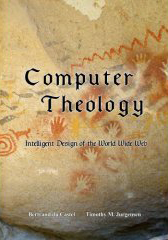PRESS
 |
COMPUTER THEOLOGY |
||||
|
8 In Search of Enlightenment
Science arose
from poetry, Johann
Wolfgang von Goethe Trust through Process
Siddhartha
Gautama was born into affluence. His family and surroundings promised a life of
luxury and comfort that most would envy. Nevertheless, dissatisfied, he
searched for spiritual meaning. He renounced his worldly possessions and left
his home to wander as an ascetic monk, searching for the fulfillment that would
allow him to declare this incarnation to be his final life. In his journey, he
came to realize that a life of deprivation did not bring him the fulfillment
that he sought. His musings suggested that a life of service did not bring it
either. Finally, he sat beneath the Bodhi Tree, promising not to arise until he
reached enlightenment. There, his quest finally ended. He had reached the state
of perfect enlightenment and he transcended to the Supreme Buddha. Where, we
might ask, did he finally come to realize was the source of enlightenment? It is all in
your head. “It’s all in
your head!” That has been a pejorative phrase for as long as most of us can
remember. When we felt our stomach ache on the day of an important examination,
perhaps the most positive comment that our mother might make was, “It’s all in
your head!” This was merely preface to a stern admonition to “Get dressed and
go to school!” However, in fact, our suggestion is not quite of this ilk.
Rather, we suggest that the processes of our minds have a dominant effect
towards determining our levels of trust. They influence our levels of trust in
things to be sure. However, perhaps even more important is the establishment of
our level of trust in processes and procedures, including these very same
processes of our minds. This obviously suggests that recursion is once again at
work. We think, and we think of thinking; right now in fact, we are thinking of
thinking of thinking. Thus far, we
have tended to discuss processes in terms of how we convey trust, not how we
establish it. However, there are significant areas where processes are at the
heart of establishing trust. We started this chapter with a brief, paraphrased
story related to the emergence of Buddhism. The words we used are perhaps a bit
vague. They are certainly metaphorical, and in some sense allegorical. In an
attempt to be a bit clearer, we can expand on them very slightly based on our
layman’s perspective of the religion. Buddhism is a non-theistic religion. Westerners often make the mistake of equating the Buddha with a deity. In reality, the figure represents the highly venerated but mortal person who |
||||
|
||||
© Midori Press, LLC, 2008. All rights reserved for all countries. (Inquiries) The contents of ComputerTheology: Intelligent Design of the World Wide Web are presented for the sole purpose of on-line reading to allow the reader to determine whether to purchase the book. Reproduction and other derivative works are expressly forbidden without the written consent of Midori Press. Legal deposit with the US Library of Congress 1-33735636, 2007.
|
ComputerTheology Intelligent Design of the World Wide Web Bertrand du Castel and Timothy M. Jurgensen Midori Press, Austin Texas 1st Edition 2008 (468 pp) ISBN 0-9801821-1-5 |
Book available at Midori Press (regular) |